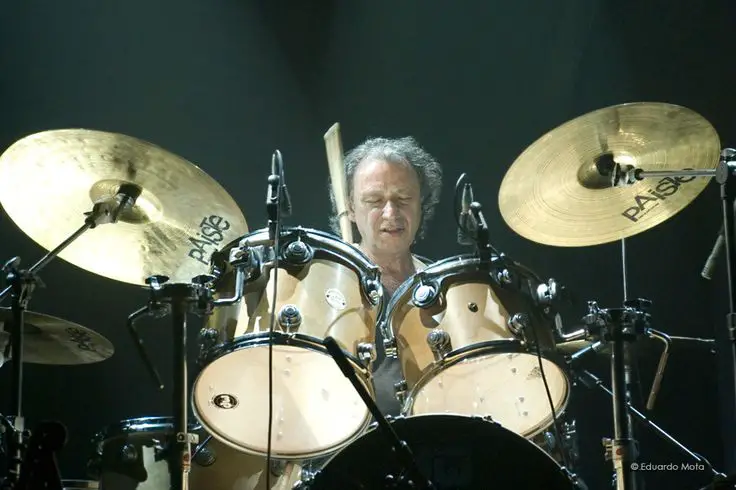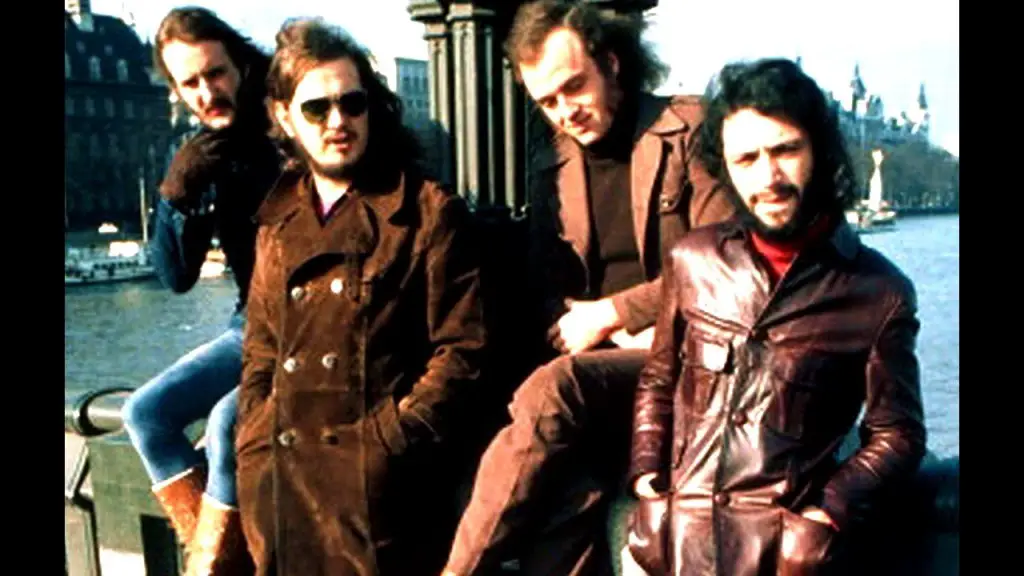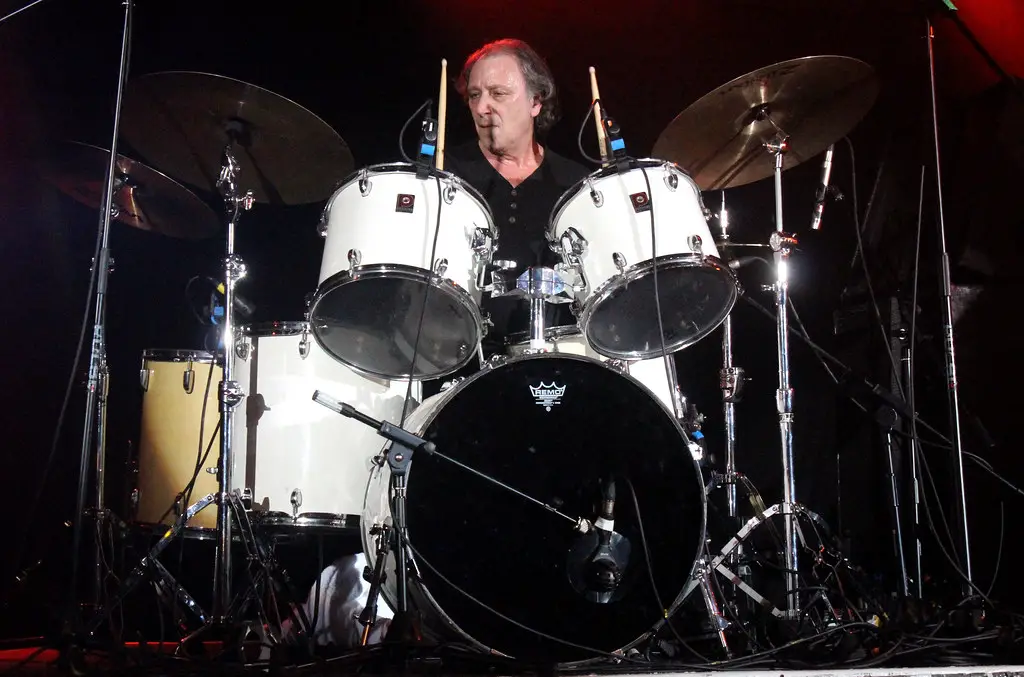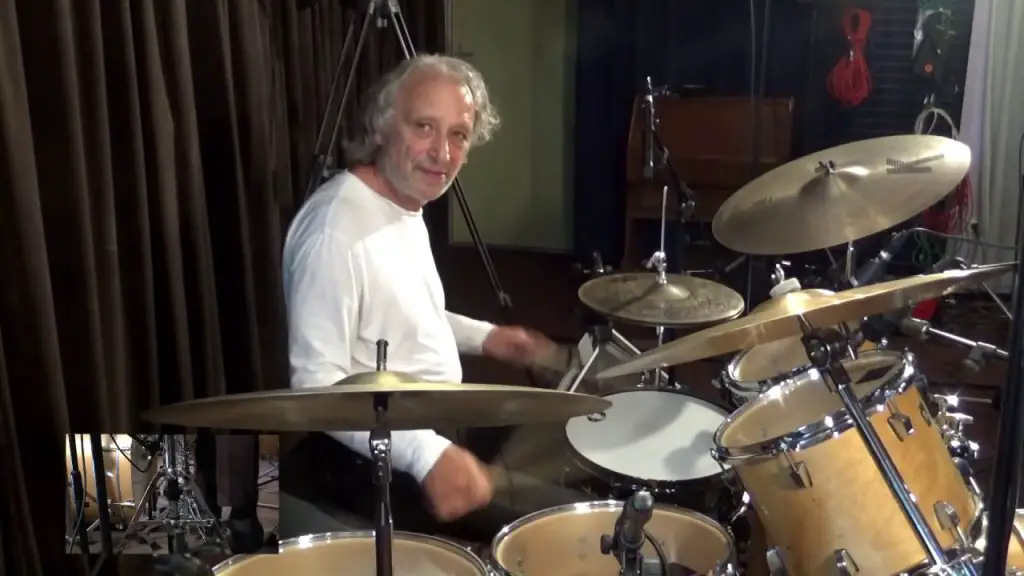All images courtesy of Glass Onyon PR

The 70s was a great time for music. It was an era where the genre known as Rock really came into its own. You had what we now know as Classic Rock; you had Arena Rock, the early stages of Metal, and of course Progressive Rock, also known as “Prog.”
Dutch band Focus was and still is one of the better Prog-Rock bands of the era. Their seminal album Focus 2, also known as Moving Waves, is nothing short of genre-defining. For those in the know, Moving Waves is a staple of Progressive Rock, and the album’s best track, which also has turned out to be the band’s signature song, “Hocus Pocus,” is a genuine display of all that makes Prog-Rock awesome.
If you’ve ever listened to Moving Waves or “Hocus Pocus,” then you’ve come to know and love the band studio wizardry, more specifically the jazzy rhythms which permeate from behind the drum kit. For those that don’t know, the musician who handled the sticks for Focus at the time is Pierre van der Linden, who, in my opinion, is one of the more underrated drummers of the era.
Today, I’ve got Pierre with us for a chat. Among other things, we talk about his career both in and out of Focus, his roots as a Jazz drummer, his early musical leanings, what’s new with Focus, and a whole lot more.
If you would like to learn more about Focus, you can head over to the group’s Facebook page. Once you’ve done that, check out this interview with Pierre van der Linden. Cheers.
Andrew:
Pierre, I appreciate you taking the time today. How have you been holding up over the last year or so? What have you been up to?
Pierre:
I am listening to music a lot, especially Modern Classical music like Stockhausen, Berio, Part, and Boulez. I also play a lot for myself. Once a week, I go to a studio and record my solo’s for two hours. I am not bored at all.
Andrew:
Before we dive into your professional career, let’s go back a bit. What first got you hooked on music?
Pierre:
I got hooked when I heard The Shadows with Brain Bennet. I was playing with Jan Akkerman in the Cellar Rockers when we were 14 years old, and I heard Louis Armstrong with Barret Deems, and of course, Gene Krupa at that time. There was Rock ‘N’ Roll with Louis Prima and Little Richard. There was music all over the place.
Andrew:
Where did the drums come into play for you? Who were some of your early influences?
Pierre:
I heard a drummer live in a band when I was 7 years old and was impressed and said to my parents, “That is what I want.” I got my first classical lesson when I was 9 years old. I saw an autobiography about Gene Krupa, and was inspired, and was practicing and playing for hours in that time. I also had a record of Buddy Rich that inspired me so much.

Andrew:
Going way back now, you joined Focus in 1971. Tell us how you got the gig?
Pierre:
Jan and I played in a known Dutch group, Brain Box. Jan left the group and went to Focus with Thijs. Then after a year, Jan called me and said that he was not satisfied with the drummer Hans Cleaver. So I met Thijs there for the first time and joined the group.
We rehearsed every day in a castle in Laren and played a lot in Holland, and it was a success.
Andrew:
With Focus, you’ve been a part of some pretty special albums. Everyone’s favorite always seems to be Focus II, also known as Moving Waves. Take me through the recording of that record. What do you remember?
Pierre:
We played “Eruption” during every concert in Holland, so when we recorded it in the studio, it stood as a house. “Hocus Pocus” was created in the studio and was a very spontaneous piece, and the yodeling was intended to be ironic. So the guitar and drum fills were a spontaneous expression, and there was a piece called “Janis” that was played in the studio for the first and last time, and we never played it live, but a beautiful piece. I met Mike Vernon there for the first time; he was very enthusiastic and stimulating.
Andrew:
Focus may well be best known for the track “Hocus Pocus.” Tell us more about the inspiration and recording.
Pierre:
It was very energetic and exciting with the yodeling, guitar solos, and drum fills in the concerts. People responded very enthusiastically. We played that piece so much; I always wanted to do it differently.

Andrew:
In 1973, you left Focus, although you did briefly return in 1975 and 1990. What led to your departure from the group? You had recorded two fantastic records, and the band seemed to be flying high. Take us through what happened.
Pierre:
It was a matter of the ego; Thijs and Jan were busy with their solo careers, and I felt isolated; there was no more contact, not in life, not in playing. That was the end for me, and I wanted to do something else. Then I met Rick van der Linden (Trace), and we made a record, and it was a relief for me, and when you listen to the record now, it is still a good album. Jan called me and said he wanted to play with me again cause he was stuck with Collin Allen. I joined Focus again and had a tour to Japan and Australië. It was horrible again, and I felt isolated again, and that was the last time.
Andrew:
In your time away from Focus, you really got in touch with your Jazz roots and joined the Free Jazz group Advance Warning. How did you end up with them?
Pierre:
I met Rinus Groeneveld, and I saw him play, and I liked his style; we had contact and played a lot together experimentally and as free as possible. Then we met Herbert Noord, the organ player, and we made records and did concerts with guitar players and other musicians. I liked it because there was development and that was very important for me.
There was freedom in it, and that was good for creating new things.
Andrew:
I wanted to talk about Dare to Be Different, which you recorded as a trio with Herbert Noord and Rinus Groeneveld. Tell us more about that record.
Pierre:
That was a trio with the bass player Wilbert de Jode. He played with us for the first time in the studio, and there was a click at the moment itself. I like this recording very much because new things happened there in the studio, and I like inspiring energy. The sound is good, and we did concerts in Holland in Jazz clubs, but it stopped after a year, and after that, we played again with Herbert Noord.

Andrew:
In 2004, you returned to Focus. Take me through the reformation. Where do things stand today? I know the band’s last record was Focus 11 in 2018. What’s next for Focus?
Pierre:
Jan Dume called me, and we met each other, the playing was good in the rehearsal, and we traveled to England for a tour. There were not so many people because it was not known enough that we existed. Then we went to Brazil, and that was a special experience. After all that, we played in Holland again, and we got another guitar player Niels van der Steenhoven. He was excellent, and we did successful concerts. With him, we reached a serious level. Niels left Focus, and in 2010 Menno Gootjes joined the group, and after a few years, Udo Pannekeet joined the group. This combination of musicians and people is better than ever for me. I think we can start recording Focus 12 as soon as we can.
Andrew:
I mentioned your Jazz roots earlier, and I wanted to dig deeper into that. You’re primarily known for your work within the cannon of Progressive Rock, but at your core, you’re more of a Jazz drummer. Tell us how your Jazz-based style has been able to translate over to the Rock side of the spectrum so successfully.
Pierre:
Because I have a feel for Rock and the creativity in Jazz, the Jazz and Latin feel is more flowing and freer. The Rock feel is more straight and tight, and the combination is interesting; you have more possibilities. The fills in Rock are more open and square, and in Jazz, more rolling, a different timing.
Andrew:
I am sure you are aware of those old school “Drum Battle” records from the 50s and 60s. So, if you could have a drum battle with anyone, past or present, who would it be?
Pierre:
I like Jo Jo Mayer or Gene Lake.

Andrew:
Are you into vinyl? Cassettes? CDs? Or are you all digital now? What are a few of your favorite albums, and why?
Pierre:
I have many cassettes of my drums and a lot of concerts over the years, and I use to listen to them almost daily. I watch a lot of YouTube concerts; it’s a blessing there is so much information. One of my favorite albums is from John Coltrane (A Love Supreme, or Sun Ship). Also, Cecil Taylor (Live in the Black Forest). His playing with his group is far beyond, and the concept is very interesting. And of course Arvo Part is very beautiful, modern religious music (good for thinking).
Andrew:
What other passions do you have? How do those passions inform your music, if at all?
Pierre:
I have a passion for writing poems about spirituality and philosophy, and I have written a lot.
And I read a lot about spirituality, which inspires me.
Andrew:
What types of drums, cymbals, and hardware are you using these days? Do you prefer vintage drums or new ones?
Pierre:
I have a Tama set and a Ludwig snare drum, and I love the sound. I have one Paiste and two K Zildjian, and hi-hat cymbals. I like the new and the vintage. It’s all about sound.
Andrew:
Last one. We seem to be nearing a light at the end of the tunnel in terms of COVID-19 restrictions. That said, what’s next on your docket? What are you looking forward to most in the pos-COVID world?
Pierre:
I hope we can play concerts again and create a new record, Focus 12.

Interested in learning more about Focus? Check out the link below:
Dig this interview? Check out the full archives of Vinyl Writer Interviews, by Andrew Daly, here: www.vinylwritermusic.com/interview





Leave a Reply